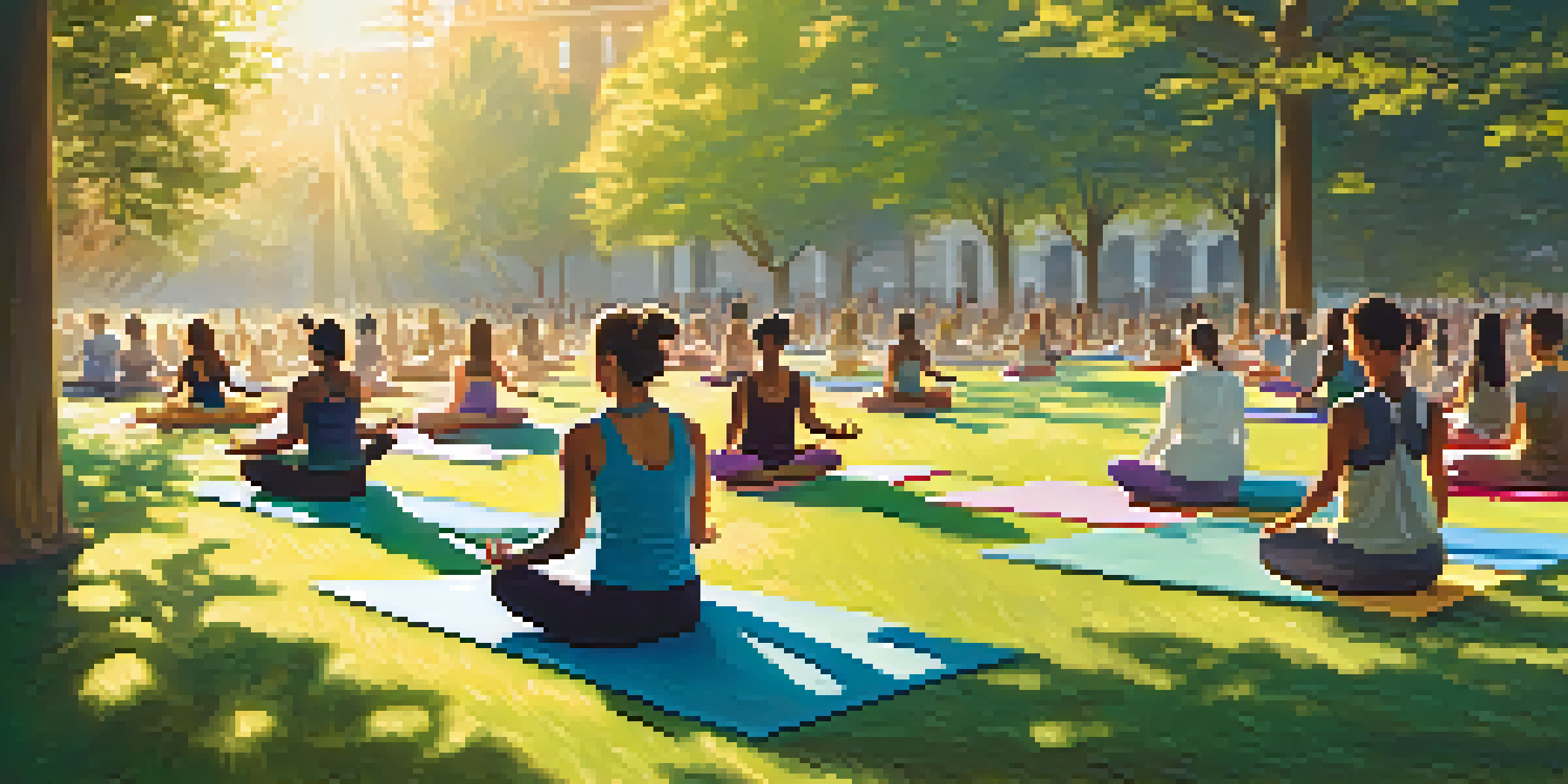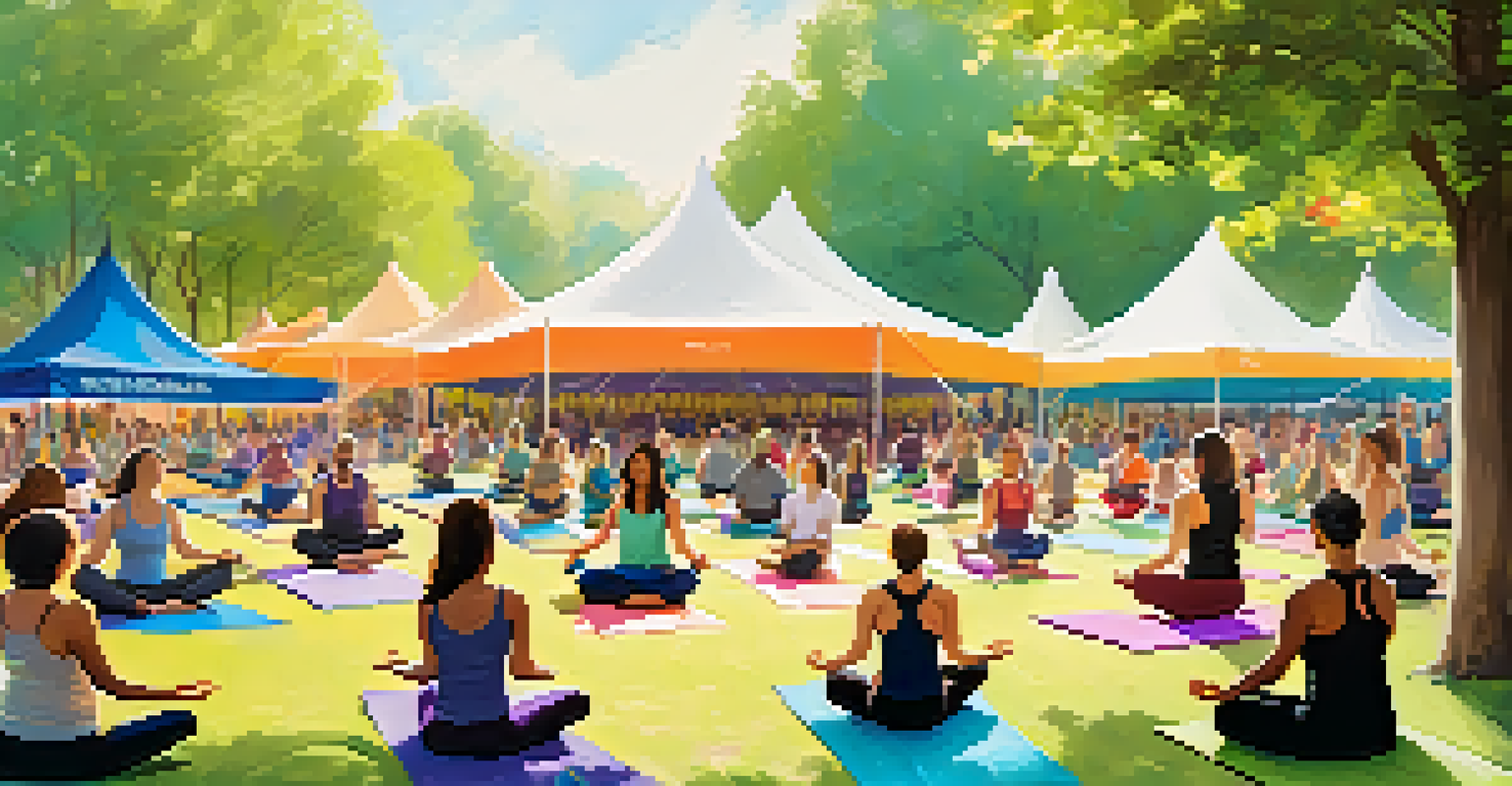The Connection Between Yoga and Community Engagement

Yoga as a Catalyst for Community Connection
Yoga is not just a solitary practice; it has the power to bring people together. When individuals gather on their mats, they create an environment of shared experience and support. This communal setting fosters connections, transforming yoga into a powerful vehicle for collective growth.
Yoga is the journey of the self, through the self, to the self.
As people come together in a class, they often share stories and emotions, creating bonds that extend beyond the studio. This social interaction can lead to lasting friendships and a sense of belonging that enriches participants' lives. It's a reminder that while yoga is personal, its benefits can be amplified through community engagement.
Moreover, yoga studios often host events, workshops, and classes that promote collaboration and social responsibility. These gatherings not only enhance the practice but also encourage participants to engage with their local communities, highlighting the interconnectedness of yoga and social connection.
Shared Wellness: The Group Dynamic in Yoga
Practicing yoga in a group setting can enhance the overall experience by creating a dynamic of shared wellness. When individuals practice together, they inspire one another, fostering a sense of camaraderie. This shared energy can elevate the practice, making it more enjoyable and fulfilling.

The group dynamic encourages accountability, as participants feel motivated to attend classes and commit to their practice. This accountability can be particularly beneficial for newcomers who might feel intimidated by starting alone. With a supportive community, they are more likely to stick with their yoga journey.
Yoga Fosters Community Connections
Engaging in yoga classes creates a supportive environment that leads to lasting friendships and a sense of belonging.
Additionally, the collective experience of yoga can lead to discussions about health, mindfulness, and personal growth. These conversations can spark interest in community initiatives, making it easier for people to engage in activities that promote well-being, both individually and collectively.
Mindfulness and Community Support: A Powerful Duo
Mindfulness, a core component of yoga, can significantly enhance community support. When individuals cultivate self-awareness through their practice, they become more attuned to the needs of others. This heightened sensitivity can lead to more compassionate interactions within the community.
Alone we can do so little; together we can do so much.
By practicing mindfulness, yoga practitioners can learn to listen actively and respond empathetically. This can create a ripple effect, encouraging others to adopt similar practices and fostering a more supportive environment. Ultimately, a mindful community is one where members feel valued and understood.
Furthermore, community engagement through mindfulness can manifest in initiatives like group volunteer efforts or mental health workshops. These activities not only strengthen community bonds but also promote a culture of care, where everyone works together to uplift one another.
Inclusivity in Yoga: Building Bridges in Communities
Yoga has the potential to be a unifying force in diverse communities. By promoting inclusive practices, yoga can bridge gaps between different cultures, ages, and backgrounds. This inclusivity not only enriches the practice but also fosters a sense of belonging for everyone involved.
Many yoga studios are now adopting inclusive teaching methods, offering classes that cater to various skill levels and backgrounds. This approach encourages people from all walks of life to participate, creating a more vibrant and diverse yoga community. When individuals feel accepted, they are more likely to engage with others.
Inclusivity Enhances Yoga Practice
By promoting inclusive practices, yoga bridges gaps between diverse communities, enriching the experience for all participants.
Such inclusivity often leads to community events that celebrate diversity, such as cultural yoga days or workshops. These initiatives can highlight the unique backgrounds of participants, fostering understanding and appreciation among community members. In this way, yoga becomes a platform for connection and dialogue.
The Role of Yoga Retreats in Community Building
Yoga retreats serve as a unique opportunity for community building, offering participants a chance to deepen their practice while forming lasting connections. These immersive experiences allow individuals to bond over shared goals and personal journeys. The focused environment often leads to meaningful conversations and friendships.
During retreats, participants engage in activities beyond yoga, such as group discussions, cooking, and hiking. These shared experiences create a sense of camaraderie that can transform relationships. As participants step out of their daily routines, they often find that the connections they form are both profound and impactful.
Moreover, many retreats emphasize the importance of giving back to the local community, such as through service projects. This commitment to community engagement not only enriches the retreat experience but also highlights the role yoga plays in fostering a sense of responsibility towards others.
Yoga and Social Justice: A Community Responsibility
As yoga continues to grow in popularity, many practitioners are recognizing their role in advocating for social justice. This connection is grounded in the principles of yoga, which emphasize compassion and interconnectedness. By engaging with these social issues, the yoga community can become a powerful force for change.
Many yoga studios are now incorporating social justice themes into their classes and events, encouraging discussions around equity and representation. This not only raises awareness but also empowers practitioners to take action within their communities. When yoga becomes a platform for advocacy, it strengthens both the practice and the community.
Yoga's Role in Social Justice
The yoga community is increasingly advocating for social justice, using its principles of compassion and interconnectedness to drive positive change.
Additionally, yoga practitioners can support organizations that align with their values, contributing to initiatives that promote social change. Whether through fundraising or volunteering, these efforts can create a more just and equitable society, showcasing how yoga can transcend the mat and make a tangible impact.
The Future of Yoga and Community Engagement
The connection between yoga and community engagement is evolving, and the future looks promising. As more people recognize the importance of mental and physical well-being, the demand for community-focused yoga experiences is likely to grow. This shift will encourage studios to prioritize inclusivity and social responsibility in their offerings.
Innovative practices, such as online classes and hybrid events, are also expanding the reach of yoga communities. These formats allow individuals from different locations to connect, fostering a sense of belonging that transcends geographical boundaries. The digital age is providing new avenues for community engagement, making yoga accessible to everyone.

Ultimately, the future of yoga lies in its ability to unite individuals for a common purpose. By continuing to emphasize connection, inclusivity, and social awareness, the yoga community can thrive, cultivating spaces that inspire personal growth and collective action.